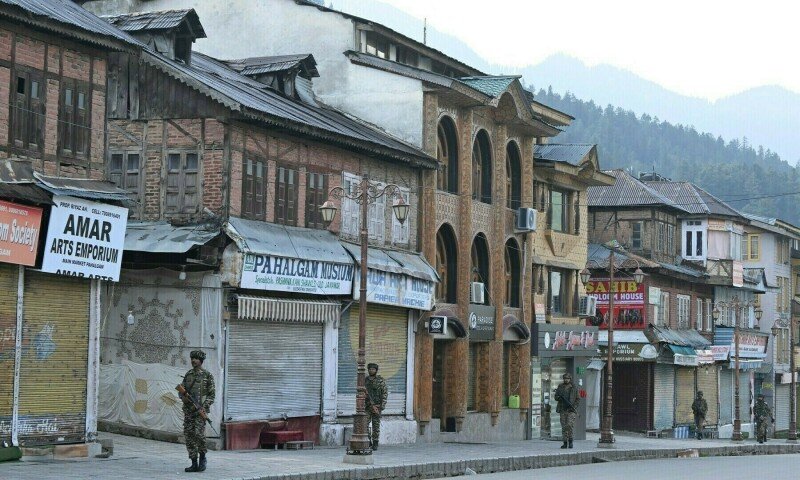Pakistani security sources said on Monday that India has once again begun “fake encounters” under the guise of countering terrorism, with an alleged plan to “use” detained Pakistanis in them, state-run Radio Pakistan reported.
The statement came after the Indian Army’s Chinar Corps said they killed three alleged “terrorists” under ‘Operation Mahadev’ in occupied Kashmir’s Srinagar. While Indian media, citing sources, has been linking one of the dead to the Pahalgam attack, no official has stated that on record.
The April 22 attack in held Kashmir’s Pahalgam killed 26 people and sparked heavy fighting between nuclear-armed India and Pakistan, as New Delhi blamed the attack on Islamabad, which strongly denied the allegations while calling for a neutral investigation.
India had launched Operation Sindoor in the wake of the Pahalgam attack, which included the deadly strikes launched on Pakistan on May 7.
“After the failure of Operation Sindoor, India has once again initiated fake encounters under the guise of Operation Mahadev,” security sources said today.
Operation Mahadev has been “launched to conceal the setbacks of Operation Sindoor”, the security sources said, adding that the “Indian regime is allegedly preparing to use innocent Pakistanis, illegally and forcibly detained, in staged encounters, falsely portraying them as cross-border terrorists”.
India has seen fake encounters as far back as 2015. The National Human Rights Commission of India — a quasi-judicial body — identified 555 instances between 2008 and 2013, but activists say the actual count is even higher.
The objective of Operation Mahadev is to suppress the “growing freedom movement” in India-occupied Kashmir and to restore the “waning political credibility” of Prime Minister Narendra Modi’s government, the security sources added.
They said India was attempting to present Operation Mahadev as a “successful military initiative to erase the embarrassment of Operation Sindoor”.
The security sources highlighted that “immediately following the Pahalgam false flag operation, the Indian Army reportedly began a series of staged encounters”.
The sources further said that on April 24, two citizens of Azad Jammu and Kashmir, Muhammad Farooq and Muhammad Deen, were “martyred in a brutal encounter by Indian forces after mistakenly crossing the border”.
Indian forces in occupied Kashmir arrested more than 2,000 Kashmiris and demolished several homes of pro-freedom Kashmiris in a sweeping crackdown following the Pahalgam incident.
The Radio Pakistan report, recalling the press briefings held on April 29 and April 30 by military spokesperson Lt Gen Ahmed Sharif Chaudhry, read that he “revealed details of 723 Pakistani nationals illegally detained in various Indian jails”.
“Additionally, 56 Pakistanis are said to be held in secret custody by Indian intelligence agencies.”
The security sources noted: “As is customary, following these alleged fake encounters, videos and photographs of the deceased, alongside planted weapons, are circulated in Indian media to support the official narrative.
“Reliable reports suggest that these detainees may be coerced into making anti-Pakistan statements and confessions before the media,” they added.
“Operation Mahadev appears to be a continuation of the Indian Army’s long-standing practice of fake encounters in IIOJK (Indian Illegally Occupied Jammu and Kashmir), where it has gained notoriety as a ‘fake encounter specialist’,” the sources said.
“India, having faced humiliation in the Pahalgam false flag operation and the failure of Operation Sindoor, now seems completely disoriented,” the security sources added.
Indian army says three suspected fighters killed in held-Kashmir
Earlier today, the Indian Army said its security forces killed three suspected fighters in India-occupied Kashmir during a clash in a wildlife reserve.
The Press Trust of India reported that the incident occurred in the Mulnar area of Harwan near the Dachigam National Park, around 30 kilometres from the disputed region’s main city of Srinagar.
“Three terrorists have been neutralised in an intense firefight,” the Indian army claimed in a statement on X. “Operation continues,” it added.
The incident took place near the major Hindu shrine of Amarnath, to which more than 350,000 people from across India have travelled as part of an ongoing pilgrimage.
The army did not immediately identify those killed, but a police officer told AFP on condition of anonymity that they were all “foreigners”.
Security forces have been hunting for the Pahalgam attackers, but they remain at large.
Clashes between fighters and government forces have drastically reduced during the last five years, but many local fighters have been killed since the Pahalgam attack.
Last month, the Global Peace Index 2025 placed the disputed region of Kashmir at the forefront of the critical escalation hotspots in the world.
The index released by the Institute for Economics and Peace (IEP) with headquarters in Sydney, stated that the situation in occupied Kashmir exemplified the fragility of ceasefire agreements in volatile geographic settings and underscored the dangers posed by non-state actors capable of triggering international crises.
The Himalayan region of Kashmir has been at the heart of the hostility between old rivals India and Pakistan, both of whom claim the region in full and have fought two of their three wars over it.
India accuses Pakistan of helping Kashmiri fighters, but Pakistan denies this and says it only provides diplomatic and moral support to Kashmiris seeking self-determination.
India’s defence minister denies bowing to pressure to end fighting
Meanwhile, India’s Defence Minister Rajnath Singh said that New Delhi had ended its military conflict with Pakistan in May as it had met all its objectives and had not responded to pressure, rejecting United States President Donald Trump’s stance that he brokered the truce.
Singh was speaking today at the opening of a discussion in parliament on the Pahalgam attack.
“India halted its operation because all the political and military objectives studied before and during the conflict had been fully achieved,” Singh said. “To suggest that the operation was called off under pressure is baseless and entirely incorrect.”
Pakistan thanked Trump for brokering the agreement, but India said Washington had no hand in it and that New Delhi and Islamabad had agreed between themselves to end the fighting.
During today’s parliament session, Congress leader Gaurav Gogoi slammed Modi’s Bharatiya Janata Party, noting that it had been 100 days since the Pahalgam attack but the government “has not been able to catch those five terrorists”, ANI reported.
Indian opposition groups have questioned what they say is the intelligence failure behind the Pahalgam attack and the government’s inability to capture the assailants — issues they are expected to raise during the parliamentary discussion.
They have also criticised Modi for coming under pressure from Trump and agreeing to end the conflict, along with Indian jets being shot down during the fighting.
Pakistan said it downed six Indian planes in air-to-air combat. India’s highest-ranking general said in late May that India switched tactics after suffering losses in the air on the first day of hostilities and established an advantage before a ceasefire was announced three days later.




